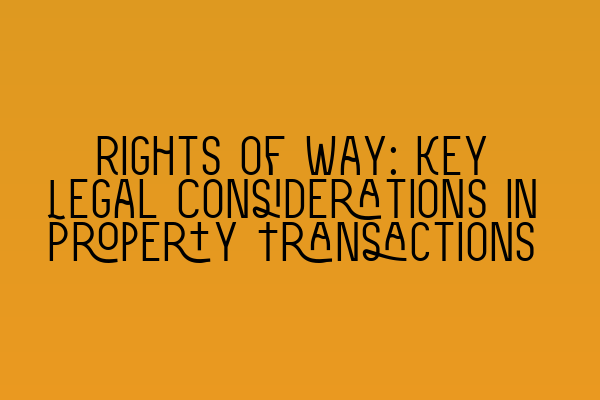Rights of Way: Key Legal Considerations in Property Transactions
When it comes to property transactions, one important aspect that needs careful consideration is the existence and status of rights of way. A right of way allows someone to pass through or use a portion of another person’s property for a specific purpose. It is a legal interest in land that must be properly understood and addressed during property transactions to avoid potential disputes and complications.
In this blog post, we will discuss the key legal considerations surrounding rights of way in property transactions. Whether you are a solicitor, a buyer, or a seller, understanding these considerations is crucial for a smooth and successful property transaction.
1. Identifying the Existence of Rights of Way
The first step in dealing with rights of way is to identify their existence. This can be done by conducting a thorough investigation of the property’s title deeds and any associated documentation. It’s crucial to look for any explicit right of way grants or reservations mentioned in the deeds. Additionally, you should also consider any long-established rights of way that may have been created through unregistered usage.
To navigate through the complexities of property title investigations, it’s important to have a solid understanding of contract law principles, including contractual capacity rights and limitations. You can learn more about contractual capacity by reading our related article on Understanding Contractual Capacity: Rights and Limitations.
2. Assessing the Nature and Scope of Rights of Way
Once a right of way is identified, it’s important to assess its nature and scope. This involves understanding the purpose for which the right of way was established, as well as any limitations or conditions attached to its use. Some rights of way may be limited to specific individuals or properties, while others may be granted for broader purposes.
Understanding the nature and scope of a right of way is crucial to ensure that it aligns with the intended use of the property. This knowledge helps in determining whether the right of way is suitable for the buyer’s needs and whether any modifications or additional rights need to be negotiated during the transaction.
To test your knowledge about contractual capacity and other contract law principles, you can take our interactive SQE mock tests for Contract Law. Test your knowledge now and improve your understanding of these essential legal concepts.
3. Easements and Legal Formalities
In property transactions involving rights of way, it’s essential to consider easements and the legal formalities associated with them. An easement is a legal right that allows a person to use someone else’s land for a specific purpose. Rights of way often fall under the category of easements and must meet certain legal requirements to be enforceable.
These legal requirements may include factors such as the duration of the right of way, whether it is registered or unregistered, and whether any third-party interests or covenants affect its validity. Properly understanding and addressing these legal formalities is crucial to ensure that the right of way is legally protected and can be enforced by the rightful parties in the future.
To get expert insights and guidance on various contract law topics, including rights of way and contractual capacity, you can join our SQE Contract Law webinars. Gain valuable knowledge and stay updated with the latest legal developments in contract law.
4. Resolving Disputes and Negotiating Modifications
During a property transaction, disputes or issues related to rights of way may arise. It’s important to address these matters properly to avoid potential conflicts and complications. If there is a dispute regarding the existence, nature, or scope of a right of way, it may be necessary to seek legal advice and potentially involve a mediator or a court to resolve the matter.
In some cases, it may be necessary to negotiate modifications or additional rights to the existing right of way. These negotiations should be carefully documented to ensure that all parties involved are aware of the agreed-upon terms and conditions.
5. Seeking Professional Advice
Dealing with rights of way in a property transaction can be complex, and it’s crucial to seek professional advice to ensure all legal considerations are adequately addressed. A solicitor specializing in property law and land law can provide valuable guidance and expertise throughout the transaction process.
At SQE Property Law & Land Law, we offer comprehensive legal services to clients involved in property transactions. Our team of solicitors has a wealth of experience dealing with rights of way and can help navigate the complexities of these legal considerations.
In conclusion, rights of way are important legal considerations in property transactions. By identifying their existence, assessing their nature and scope, understanding legal formalities, resolving disputes, and seeking professional advice, you can ensure a smooth and successful property transaction.
For more information on contractual capacity and other essential contract law concepts, explore our article on SQE Prep: Mastering the Essentials of Contract Law.
Remember, proper understanding of contractual capacity is crucial to ensure the enforceability and validity of rights of way and other legal interests in property transactions. Explore our article on Contractual Capacity: Understanding Legal Competence in Contracting Parties to gain in-depth knowledge of this important legal principle.
Contact SQE Property Law & Land Law today to benefit from our expertise in property transactions and to ensure that all your rights of way are properly addressed.
